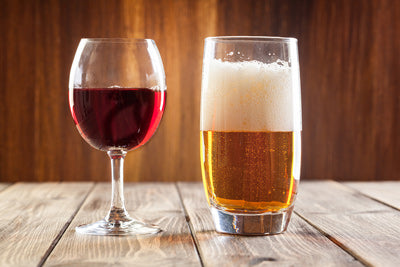Bottoms Up – The Health and Wellness Benefits of Alcohol

Over 40 years of research and 100 published studies have shown that consistent, moderate consumption of alcohol can have a number of health benefits. The guidelines outlined in most health-related studies generally cite 14 grams of alcohol per day for men (two drinks), and 7 grams per day for women (one drink). A ‘drink’ is considered to be 1.5 ounces of spirits, 5 ounces of wine, or 12 ounces of beer.
Moderation is Key
There can be a dark side to alcohol when consumed in excess. Overstepping the recommended “one drink for women, two drinks for men” per day guideline can raise the risk of high blood pressure, diabetes, heart failure, various cancers, dementia, and other serious health issues.
Conversely, moderate alcohol consumption is associated with a 25%-40% reduction in risk of heart attack, stroke, peripheral vascular disease, and death from all cardiovascular causes. In a review of 24 studies, women who enjoyed a glass of wine every day had a lower risk of mortality from all causes when compared to women who drank less often. Another recent study found equal benefits for those drinking gin, so it’s possible that the health benefits may be more from the alcohol than from the polyphenols and resveratrol found in red wine.
Modest alcohol consumption is associated with protection against heart disease, as it helps raise levels of high-density lipoprotein (HDL) while helping to prevent the creation of small blood clots that can lead to heart attack and stroke.
Other benefits of alcohol may include a stronger immune system, longer average lifespan, and improved libido. Alcohol consumption may contribute to a decreased risk of dementia, kidney stones and gallstones, and help lower the risk of developing diabetes. One rat study published in 2015 by Texas A&M found that resveratrol (a compound found in the skin of red grapes) improved cognition and memory. While I normally recommend red wines, one study found that the phenols and polyphenols in white wine can help support weight loss more than red wines. I recommend dry red and white wines, which are lowest in sugar, but if you are a diabetic, spirits may be a better option.
Dr. Fred Prescatore, a respected New York physician, recommends choosing spirits as red wine and beer contain naturally occurring sugars (maltose in beer, fructose in wine). For those who don’t enjoy red wine, Dr. Pescatore advises getting resveratrol from dietary supplements.
Beer is well known for its bone-building benefits thanks to its high silicon content. And while I recommend darker beers for everyone (they are higher in iron and B-vitamins), studies show that women generally see the greatest improvements in bone density. Women who enjoyed two beers per day had a bone density increase of over 8%. Additionally, the natural phytoestrogens in beer can help to reduce hot flashes and menopausal symptoms.
Recently published studies have identified a flavonol found in hops called xanthohumol that may protect brain cells from Parkinson’s and Alzheimer’s, reduce insulin levels, lower “bad” LDL cholesterol, and help with weight loss. Beer is also high in magnesium and calcium.
If beer isn’t your drink of choice, I recommend supplementing with nutritional yeast (an excellent and tasty source of B-vitamins), and Biosil (a well-absorbed form of silica). Silica also helps trigger collagen production which can help produce a more youthful appearance by minimizing fine lines and wrinkles, while helping to improve joint health and bone mineral density.
Allergies and Reactions to Wine
Up to 70% of consumers suffer from migraine headaches, nasal congestion, morning hangovers, hives, itchy skin, or rashes when they drink wine. This is usually caused by our body’s immune reaction to the natural histamines in red wine, or the sulfites added to white wine. A new product called The Wand by PureWine Inc. is a small spoon-like device designed to absorb and remove histamines and sulfites while improving flavour through aeration. Simply inserting The Wand in your glass of wine for three minutes may allow those with sensitivities to enjoy wine without side effects. In a blind taste test, experienced wine tasters could not tell which wine had been treated with The Wand, and some felt the wine actually tasted better.
Folate
There is research associating low folate levels with an increased risk of breast cancer in women who drink two or more drinks per day. As alcohol blocks the absorption of folate, I recommend that women who consume more than one drink per day take a multivitamin for nutritional support that includes folate (not folic acid) in the bioactive form. This form of folate is also known as 5-methyltetrahydrofolate, L-5-MTHF, Methylfolate, or Metafolin. As ten times more women die each year from heart disease than breast cancer, I believe the cardiovascular benefits far outweigh the risks (which can be mitigated by folate supplementation). I also recommend that women limit their alcohol consumption to one drink per day.
Alcohol and Relationships
In a study that included about 3000 couples married for an average of 33 years, researchers found that couples that drink alcohol together in moderation had more satisfying marriages. The study published in The Journals of Gerontology also indicated that if only one person in the relationship drinks that this can have a negative impact on marriage. However, when both abstained, there was also a positive impact on the relationship. In other words, it may be best for couples to drink together in order to experience the many health benefits attributed to moderate alcohol consumption, it might also contribute to a happier and longer-lasting marriage. Bottoms up.
Health Disclaimer. Copyright ©2017. Nathan Zassman is a trained nutrition practitioner with a WSET Level 2 Award in Wines, and the owner of Aviva Natural Health Solutions.
